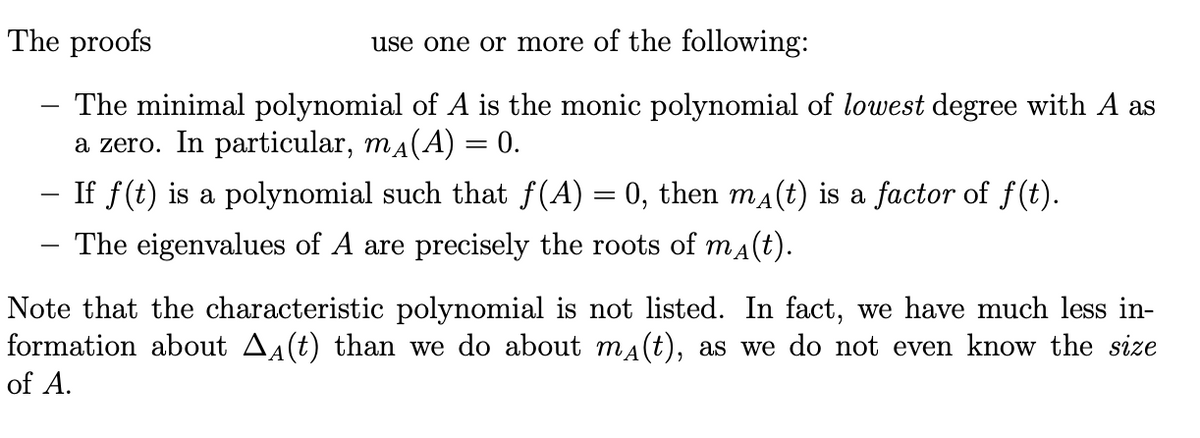Let A be an n x n matrix and let I be the n x n identity matrix. Show that if A? = I and A + I, then A= -1 is an eigenvalue of A.
Let A be an n x n matrix and let I be the n x n identity matrix. Show that if A? = I and A + I, then A= -1 is an eigenvalue of A.
Elementary Linear Algebra (MindTap Course List)
8th Edition
ISBN:9781305658004
Author:Ron Larson
Publisher:Ron Larson
Chapter7: Eigenvalues And Eigenvectors
Section7.1: Eigenvalues And Eigenvectors
Problem 55E
Related questions
Question
100%
for this problem, it cannot be assumed that A is diagonal. In particular, A2 = A does not imply A = 0 or A = I, and A2 = I does not imply A = ±I.
Helpful notes attached

Transcribed Image Text:Let A be an n x n matrix and let I be the n x n identity matrix. Show that if A? = I
and A + I, then A= -1 is an eigenvalue of A.

Transcribed Image Text:The proofs
use one or more of the following:
The minimal polynomial of A is the monic polynomial of lowest degree with A as
a zero. In particular, ma(A) = 0.
- If f(t) is a polynomial such that f(A) = 0, then ma(t) is a factor of f(t).
The eigenvalues of A are precisely the roots of ma(t).
Note that the characteristic polynomial is not listed. In fact, we have much less in-
formation about A4(t) than we do about ma(t), as we do not even know the size
of A.
Expert Solution
This question has been solved!
Explore an expertly crafted, step-by-step solution for a thorough understanding of key concepts.
Step by step
Solved in 2 steps with 2 images

Recommended textbooks for you

Elementary Linear Algebra (MindTap Course List)
Algebra
ISBN:
9781305658004
Author:
Ron Larson
Publisher:
Cengage Learning

Linear Algebra: A Modern Introduction
Algebra
ISBN:
9781285463247
Author:
David Poole
Publisher:
Cengage Learning

Algebra & Trigonometry with Analytic Geometry
Algebra
ISBN:
9781133382119
Author:
Swokowski
Publisher:
Cengage

Elementary Linear Algebra (MindTap Course List)
Algebra
ISBN:
9781305658004
Author:
Ron Larson
Publisher:
Cengage Learning

Linear Algebra: A Modern Introduction
Algebra
ISBN:
9781285463247
Author:
David Poole
Publisher:
Cengage Learning

Algebra & Trigonometry with Analytic Geometry
Algebra
ISBN:
9781133382119
Author:
Swokowski
Publisher:
Cengage